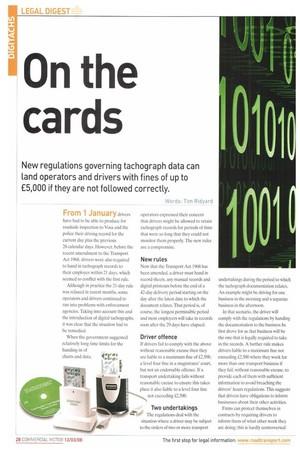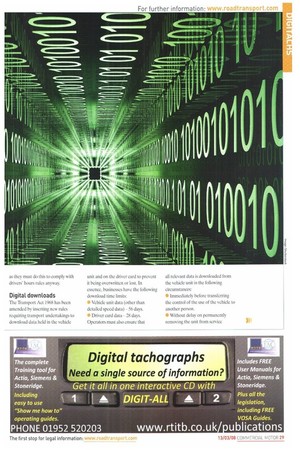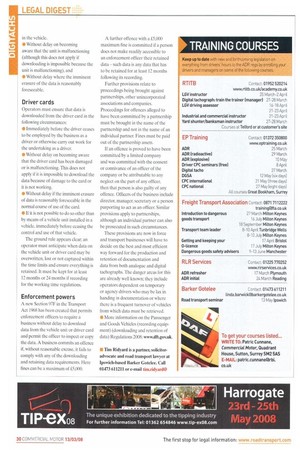On the cards
Page 28

Page 29

Page 30

If you've noticed an error in this article please click here to report it so we can fix it.
New regulations governing tachograph data can land operators and drivers with fines of up to £5,000 if they are not followed correctly.
Words: Tim Ri1v1r=
From 1 January drivers have had to be able to produce for roadside inspection to Vosa and the police their driving record for the current day plus the previous 28 calendar days. However, before the recent amendment to the Transport Act 1968, drivers were also required to hand in tachograph records to their employer within 21 days, which seemed to conflict with the first rule.
Although in practice the 21-day rule was relaxed in recent months, some operators and drivers continued to run into problems with enforcement agencies. Taking into account this and the introduction of digital tachographs, it was clear that the situation had to be remedied.
When the government suggested relatively long time limits for the handing-in of charts and data, operators expressed their concern that drivers might be allowed to retain tachograph records for periods of time that were so long that they could not monitor them properly. The new rules are a compromise.
New rules
Now that the Transport Act 1968 has been amended, a driver must hand in record sheets, any manual records and digital printouts before the end of a 42-day delivery period starting on the day after the latest date to which the document relates. That period is, of course, the longest permissible period and most employers will take in records soon after the 29 days have elapsed.
Driver offence
If drivers fail to comply with the above without reasonable excuse then they are liable to a maximum fine of £2,500, a level four fine in a magistrates' court, but not an endorsable offence. If a transport undertaking fails without reasonable excuse to ensure this takes place it also liable to a level four fine not exceeding £2,500.
Two undertakings
The regulations deal with the situation where a driver may be subject to the orders of two or more transport undertakings during the period to which the tachograph documentation relates. An example might be driving for one business in the morning and a separate business in the afternoon.
In that scenario, the driver will comply with the regulations by handing the documentation to the business he first drove for as that business will be the one that is legally required to take in the records. A further rule makes drivers liable to a maximum fine not exceeding £2,500 where they work for more than one transport business if they fail, without reasonable excuse, to provide each of them with sufficient information to avoid breaching the drivers' hours regulations. This suggests that drivers have obligations to inform businesses about their other activities.
Firms can protect themselves in contracts by requiring drivers to inform them of what other work they are doing; this is hardly controversial as they must do this to comply with drivers' hours rules anyway.
Digital downloads
The Transport Act 1968 has been amended by inserting new rules requiring transport undertakings to download data held in the vehicle unit and on the driver card to prevent it being overwritten or lost. In essence, businesses have the following download time
8 Vehicle unit data (other than detailed speed data) -56 days. * Driver card data -28 days. Operators must also ensure that
all relevant data is downloaded from the vehicle unit in the following circumstances: • Immediately before transferring the control of the use of the vehicle to another person.
• Without delay on permanently removing the unit from service in the vehicle.
• Without delay on becoming aware that the unit is malfunctioning (although this does not apply if downloading is impossible because the unit is malfunctioning), and • Without delay where the imminent erasure of the data is reasonably foreseeable.
Driver cards Operators must ensure that data is downloaded from the driver card in the following circumstances: • Immediately before the driver ceases to be employed by the business as a driver or otherwise carry out work for the undertaking as a driver.
• Without delay on becoming aware that the driver card has been damaged or is malfunctioning. This does not apply if it is impossible to download the data because of damage to the card or it is not working.
• Without delay if the imminent erasure of data is reasonably foreseeable in the normal course of use of the card.
• If it is not possible to do so other than by means of a vehicle unit installed in a vehicle, immediately before ceasing the control and use of that vehicle.
The ground rule appears clear; an operator must anticipate when data on the vehicle unit or driver card may be overwritten, lost or not captured within the time limits and ensure everything is retained. It must be kept for at least 12 months or 24 months if recording for the working time regulations.
Enforcement powers A new Section 97F in the Transport Act 1968 has been created that permits enforcement officers to require a business without delay to download data from the vehicle unit or driver card and permit the officer to inspect or copy the data. A business commits an offence if, without reasonable excuse, it fails to comply with any of the downloading and retaining data requirements. Here fines can be a maximum of £5,000. A further offence with a £5,000 maximum fine is committed if a person does not make readily accessible to an enforcement officer their retained data — such data is any data that has to be retained for at least 12 months following its recording.
Further provisions relate to proceeding being brought against partnerships, other unincorporated associations and companies. Proceedings for offences alleged to have been committed by a partnership must be brought in the name of the partnership and not in the name of an individual partner. Fines must be paid out of the partnership assets.
If an offence is proved to have been committed by a limited company and was committed with the consent or connivance of an officer of the company or be attributable to any neglect on the part of any officer, then that person is also guilty of any offence. Officers of the business include director, manager, secretary or a person purporting to act as an officer. Similar provisions apply to partnerships, although an individual partner can also be prosecuted in such circumstances.
These provisions are now in force and transport businesses will have to decide on the best and most efficient way forward for the production and retention of documentation and data from both analogue and digital tachographs. The danger areas for this are already well known; they include operators dependent on temporary or agency drivers who may be lax in handing in documentation or where there is a frequent turnover of vehicles from which data must be retrieved.
• More information on the Passsenger and Goods Vehicles (recording equipment) (downloading and retention of data) Regulations 2008: www.dflgov.uk.
• Tim Ridyard is a partner, solicitoradvocate and road transport lawyer at Ipswich-based Barker Gotelee. Call 01473 611211 or e-mail tim.ridyard@








































































































































































